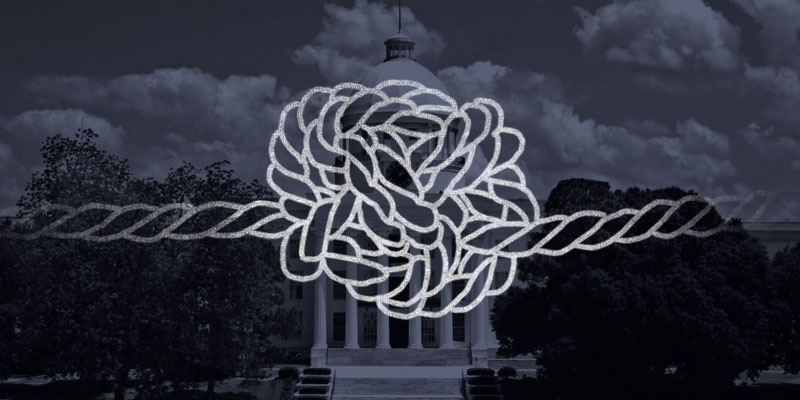
Alabama’s governing systems are a collective mess.
Many of my columns here at Yellowhammer will detail that mess – or those messes – and unflinchingly will advocate reforms, no matter whose toes get stomped or whose power bases get challenged.
I write as a lifelong, committed Madisonian conservative. Put the stress on “Madisonian,” which means I promote a philosophy, not an ideology. (For the difference, please read Eric Hoffer, Richard Weaver, and C.S. Lewis, among others, and also please review the actual practices of Ronald Reagan.) This means that while principles endure, mere opinions must be based in facts – and those opinions ought to be modifiable, at least at the edges, by empirical evidence.
As I wrote in an essay for a college publication more than 30 years ago, “such a conservatism is open both to question and to questing, to discussion without repercussion, not because it feels it is wrong but because it always strives to be more right.”
Within those parameters, though, opinions can still be both strong and strongly expressed. After nearly two decades of covering Alabama stories, I enter this new forum with the following opinions that, while open to further review, are currently quite strong.
First, Alabama’s state Constitution may be the worst such document in American history. Convoluted, complicated, counterproductive, and absurdly long, it desperately needs major revision and simplification. Indeed, if it were practical, Alabamans should trash the whole thing and start over, but as a practical man I accept that is an unlikely undertaking.
Second, Alabama’s government is far too centralized rather than open to local innovations, which makes it both ossified and much more easily corruptible. It also allows a small number of groups – often known as the “Big Mules” – to wield inordinate power. Now, sometimes they happen to wield it for good purposes. But if they don’t, they should be taken down a peg or two hundred.
Third, even hard-line conservatives should recognize that many solemn obligations of state government are seriously underfunded here. Among them are prisons/jails, the mental health system, some sheriffs and law enforcement agencies, and (due to federal mandates) Medicaid. One way or another, whether via savings elsewhere or new revenue sources, those functions should be fully supported. (Any conservative who is allergic to the very word “tax,” by the way, isn’t a real conservative.)
Fourth, while Alabama state government is comparatively lean, the first (but not only) focus for those wanting to meet the solemn obligations above should indeed be savings elsewhere, not new taxes. As a former staffer on the U.S. House Appropriations Committee when in just two years it was saving what was then a huge $50 billion in domestic discretionary spending (actual dollars, not merely from some projected “rate of increase”), I have no patience with government waste.
Fifth, to better apply savings from some areas to needs in other areas, state government absolutely must be allowed to modify its system of constitutionally earmarking an absurdly high percentage of its revenues. The entire idea of representative government is that the general public must entrust at least some significant discretion – must indeed delegate real authority – to those it elects to office.
Sixth, Alabama’s tax system is badly unbalanced and horribly regressive. Both state government and local governments rely far too heavily on sales taxes, and a bit too lightly on property taxes. Alabama could cut the former a bit and hike the latter just a smidgen and still be near the very bottom of states in property-tax burden while still among the highest in sales-tax burden. That last sentence isn’t mere opinion; it’s empirical fact.
Seventh, Alabama’s educational system vastly under-performs; its central bureaucracy is badly bloated; and its state school board and community of administrators are horribly incestuous (figuratively speaking). Indeed, the current state board is an embarrassment. Meanwhile, the state’s adoption of Common Core, and abandonment of full funding for the Alabama Math Initiative and Alabama Reading Initiative, reversed real progress in educational attainments, so that Alabama is again one of the worst performing states in the union.
Eighth, the truth(s) of race relations and racism in Alabama is/are far more complicated than almost anybody admits. Bigotry here is far less prevalent than most of the rest of the country believes, but still definitely more prevalent than most Alabamans readily acknowledge. (It also befouls us, at least somewhat, from more than one direction or ethnic subgroup.) Meanwhile, race relations also are more nuanced than either the national critics or the state deniers would concede.
Ninth, on the plus side, and amidst a general paucity of truly excellent elected officials, Alabama also has boasted (in just the 20 years I’ve been here) a few of the finest public servants I’ve come across in my entire life. (I was born into a very political family, 53 years ago.) I won’t name those still active in politics today, because I’ll be covering them and there’s always the chance they’ll screw up. But as I write these columns I’ll surely be dropping the names of those who are retired or passed away – the late state Sen. Hap Myers of Mobile comes to mind – because, even though Alabama’s government needs improvement, that doesn’t negate the many things and people of which it should be proud. And as with some public figures, so with its culture: For all my current criticisms, Alabama is a magnificent state with wonderful people, and I intend to trumpet our great strengths to a national audience.
Tenth and finally, and even writing as a huge, lifelong fan of football, I must insist that Alabamans in general are far too obsessed with football, to the absolute detriment of education and the broader culture. (And Nick Saban is overpaid)….
Okay, now I’ll show myself through the door, before I’m tarred, feathered, blitzed, and body-slammed. But please do watch this space. There’s lot of ground to cover.
Yellowhammer Contributing Editor Quin Hillyer, of Mobile, also is a Contributing Editor for National Review Online, and is the author of Mad Jones, Heretic, a satirical literary novel published in the fall of 2017, available via Amazon.









